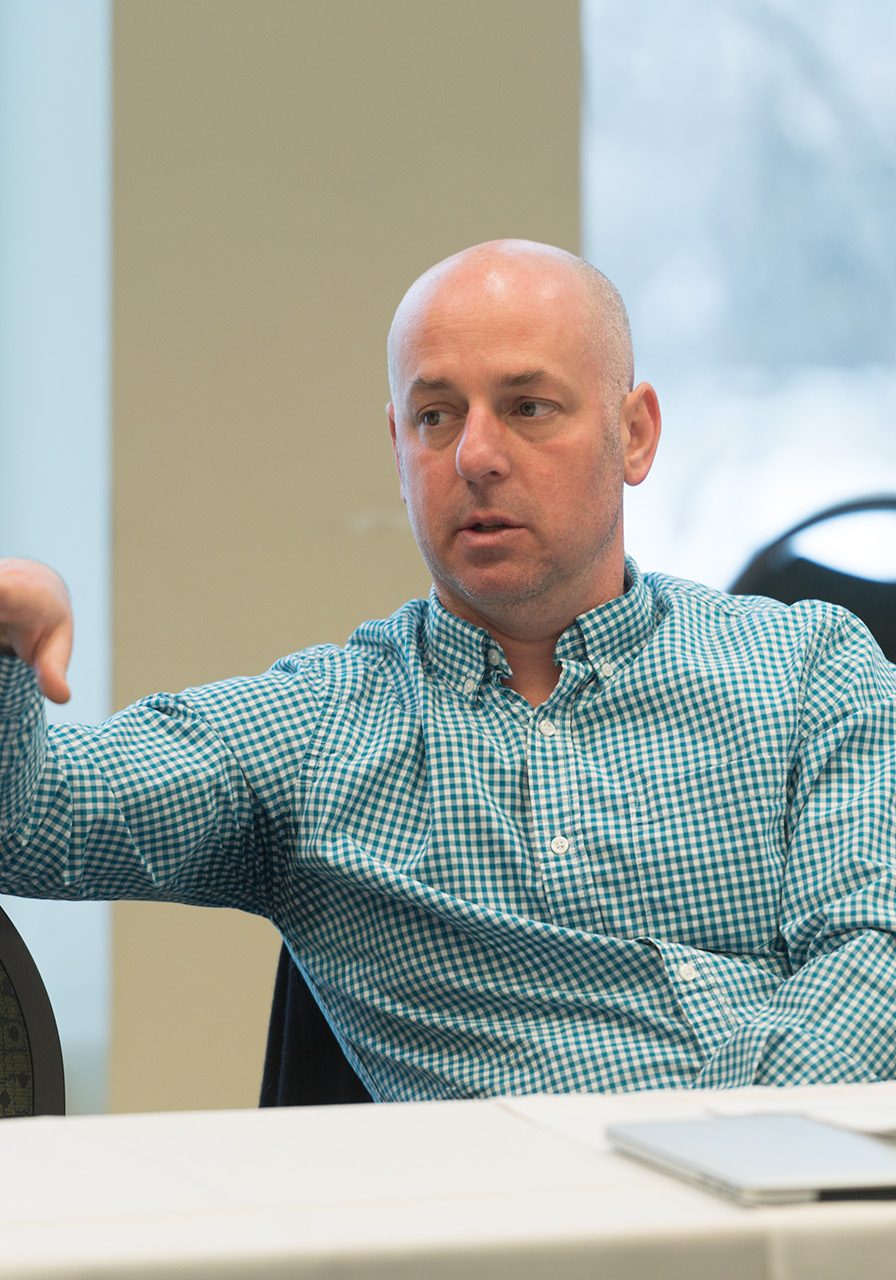“Ethics asks what we owe to one another and how we should treat one another. The internet has changed the landscape in which we, as humans, relate, and ethicists need to keep pace,” explains Assistant Professor of Philosophy Moti Gorin.

Gorin is a bioethicist—a specialist within the field of applied ethics. He articulates two general aims of bioethicists: “The first is better to identify and understand ethical issues in the life sciences, medical research, and clinical practice. The second is to provide ethical guidance to scientists and health professionals as they do their work. This second aim can be achieved directly, as when clinical ethicists work with physicians or participate in IRBs [Institutional Review Boards], or indirectly, as when bioethicists serve on regulatory committees that develop and enforce ethical standards and guidelines.”
In a new publication in the Hastings Center Report, Gorin and his co-authors, Melanie Terrasse and Dominic Sisti, are focused on the first aim—identifying, understanding, and urging more sustained attention to what they see as a new set of issues arising from our interactions with and through the internet. The authors demonstrate how online technologies affect human health and well-being and thus are of special concern to bioethicists. In the article, they consider issues such as mental health concerns from prolonged online exposure, the spread of health misinformation on social media platforms, and the rise of telemedicine in rural areas.
The problems begin with the use of the internet itself. Gorin explains, “The internet is a tremendous resource, unparalleled in human history. But, like practically any other resource, it can be used well or badly.” Gorin continues, “studies show that the heavy use of the internet, especially social media, can have negative mental health effects.” These negative repercussions include anxiety and depression, especially in girls. According to a study conducted by Facebook, reductions in well-being are more likely to occur when one is engaged with the internet through passive consumption of content, rather than actively involved with others.

Gorin targets corporations in producing this effect: “One problem, at least as I see it, is the incentive structure. Facebook, for example, is not primarily or even largely concerned with promoting or even respecting human welfare. They are concerned, first and foremost, with expanding their market share and maximizing profits.” Given that the internet is driven by this ‘attention economy,’ corporations are concerned with keeping users on their platforms and have no incentive to consider the long-term health implications of such use.
Gorin explains that social media, via the use of proprietary algorithms, also lends itself to the reproduction of all sorts of echo chambers, i.e., online spaces that broadcast a narrow range of viewpoints, including views about our health. Our online engagement in such spaces confirms and convinces us that a particular position, often the one we already hold, is the right one. Over time, this can lead some people to believe that extreme views are commonplace. “We’ve seen an increase in ‘fake news,’ the proliferation of anti-vaccine communities, and the rise of charlatans across the internet,” Gorin explains. Bioethicists should ask whether or not social media companies have an obligation to promote public health by monitoring, and possibly censoring, blatantly false and possibly harmful content from their platforms.
Furthermore, Gorin and his co-authors point out that too much online health information is misleading or simply wrong. For example, two studies—one on YouTube videos on sunscreen, tanning beds, and skin cancer prevention and another on state-funded pregnancy resource centers—show a high degree of false and misleading health information that does not align with prevailing medical guidelines. Gorin responds, “Bioethicists should be aware of inaccurate health claims and, in collaboration with communications scholars and legitimate health care news platforms, develop strategies to quickly and effectively counter pseudoscience with trustworthy health information.” Some companies, like Facebook, engage in some self-policing but Gorin claims that it rarely goes far enough in regulating misinformation.
Bodaken Philosophy Symposium
Interested in learning more about the philosophical impacts of echo chambers? Attend the Bodaken Philosophy Symposium workshop this fall.
Living Together Online: Social Epistemology, Ethics, and the Internet
October 15-16, 2019
Even the practice of healthcare has shifted with the rise of online communication with both benefits and disadvantages. There are many more opportunities now for “telemedicine” or “e-health” in which a healthcare provider treats a patient remotely via video chats or instant messaging. This is most commonly practiced when serving members of rural communities who lack access to doctors and necessary treatment. Gorin and his colleagues explain: “Telemedicine allows rural residents to benefit from medical consultations with specialists they could not otherwise access, thus making it an effective and cost‐efficient solution to providing care to hard‐to‐reach populations. For this reason, many have argued that telemedicine offers large benefits with regards to issues of social justice and equitable access to care.”
While telemedicine may seem like an advantage in many ways, Gorin argues that it may exasperate the inequities that rural communities already face in relation to public services. Furthermore, the authors demonstrate how remote care may “depersonalize medical interactions and erode authentic therapeutic relationships with patients. For example, some doctors have expressed concerns that the lack of physical touch and smell could affect their ability to make accurate diagnoses.” The widespread use of telemedicine may mask the real need of rural citizens to have increased physical access to medical practitioners.
The provider-patient relationship is also more likely to enter blurry ethical terrain with the ubiquity of social media and pervasive public sharing of personal information. Gorin explains, “this raises so many ethical questions. Can a doctor (or psychologist, or therapist) ‘google’ a patient? Can she snoop on her patients’ social media accounts? While this may certainly shed light on problems like general health, substance use, or relationship stress, there are definitely issues of consent that need to be navigated here.” Likewise, medical practitioners need to be mindful of their own social media posts. While social media may help humanize providers, there is also the chance of eroding trust in them if they post inappropriate content, such as patient interactions or their own health problems. The private/public boundary becomes very blurry, if even visible at all, in a time when so much of our lives is publicly accessible.
With the rise of the internet comes problems—for civil discourse, public health, and corporate manipulation—that we could not have imagined a generation ago. While there are many incentives for technological advancements, those incentives are often independent of any ethical considerations. Gorin thinks we should all be more mindful of what is happening “behind the scenes” and the motivations and incentives of those creating and maintaining online platforms. In the end, Gorin recommends that “we should find ways to influence the development and implementation of these technologies, such that it’s not only a small number of people with narrow interests who make these incredibly impactful decisions.” The more the internet becomes democraticized in its very production, the more likely it will serve the interests, health, and well-being of all its users.
